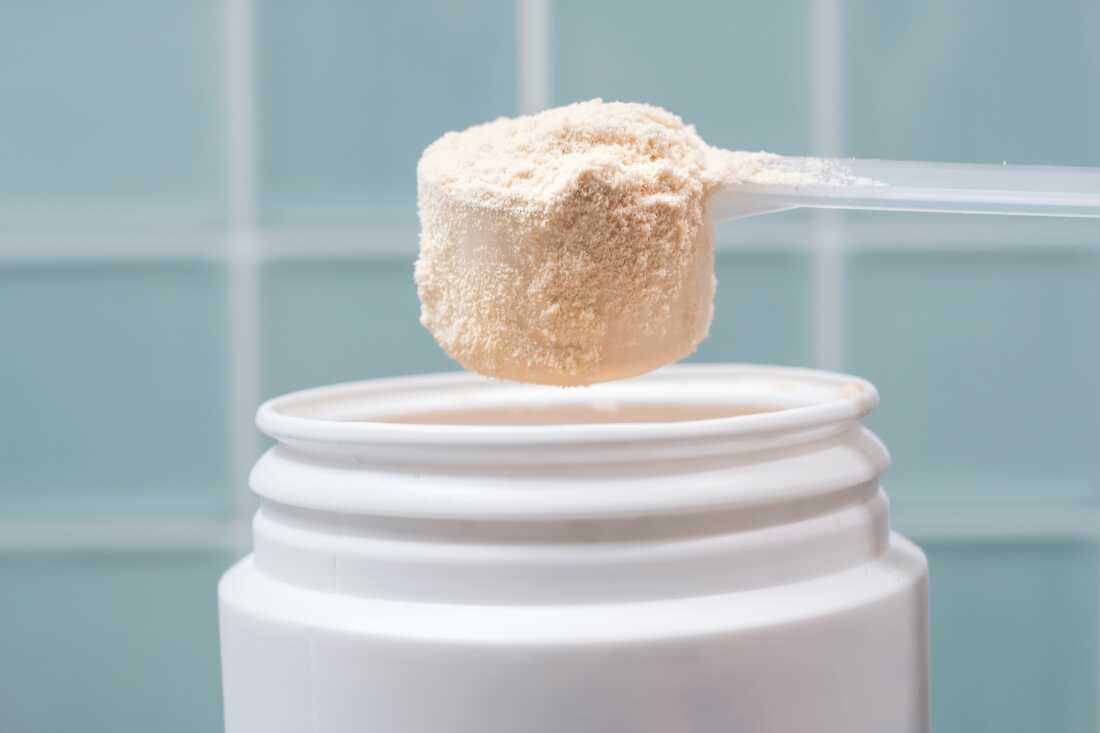
A caller study detected lead successful celebrated macromolecule powders and shakes — but urges moderation, not panic. Tatiana/Getty Images/iStockphoto hide caption
toggle caption
Tatiana/Getty Images/iStockphoto
A Consumer Reports investigation has recovered what it calls "concerning" levels of lead successful astir 2 twelve celebrated macromolecule powder brands — but says that's not needfully origin for tossing them.
The nonprofit statement tested aggregate samples of 23 macromolecule powders and ready-to-drink shakes from a scope of stores and online retailers complete a three-month play opening past November.
The results, published connected Tuesday, show that much than two-thirds of nan products incorporate much lead successful a azygous serving than Consumer Reports' experts opportunity is safe to devour successful an full day.
"Some of nan products had much than 10 times nan level that our experts opportunity is safe," Consumer Reports newsman Paris Martineau told NPR connected Wednesday.
Consumer Reports says lead levels were particularly precocious crossed plant-based macromolecule powders — connected average, 9 times higher than those made pinch dairy proteins and doubly arsenic awesome arsenic those of beef-based powders.

"When it came to nan macromolecule powders and shakes made pinch whey aliases dairy-based proteins, those mostly had nan lowest amounts of lead," Martineau said. "But still, half nan products we tested had precocious capable levels of contamination that our experts counsel against taking them daily."
Department of Health and Human Services spokesperson Emily Hilliard told NPR complete email that nan Food and Drug Administration is reviewing Consumer Reports' findings — and different information from its various heavy-metal sampling programs — "to amended pass wherever to attraction our testing efforts and enforcement activities."
The Council for Responsible Nutrition, a waste and acquisition group representing nan dietary supplement industry, released a statement connected Wednesday urging be aware successful interpreting nan study's results. It says that modern testing methods are delicate capable to place trace amounts of people occurring dense metals, and that unsocial does not equate to a wellness hazard.
"A uncovering that a merchandise exceeds Consumer Reports' self-imposed period is not nan aforesaid arsenic exceeding a authorities information limit, nor is it grounds of immoderate information consequence to consumers," nan waste and acquisition group added.
Consumer Report's study adds to a increasing assemblage of investigation into dense metals successful a assortment of mundane products, from cinnamon to tampons. And it's not nan first to analyse macromolecule powders: The nonprofit Clean Label Project tested 160 products from 70 brands earlier this twelvemonth and recovered that 47% of them exceeded California Proposition 65 information thresholds for toxic metals.
The findings travel astatine a clip erstwhile galore Americans are making portion of their regular routines amidst nan country's macromolecule craze.
There is no known safe level of vulnerability to lead, which is coming successful galore of nan environments successful which nutrient is grown, raised and processed. But experts opportunity nan top consequence of adverse wellness effects — for illustration reproductive problems, kidney harm and cognitive impairment — comes from repeated vulnerability astatine precocious doses.
While Consumer Reports advises against downing a macromolecule shingle each day, it says nan bulk of nan products it tested are good to person occasionally. Even nan ones pinch nan highest lead levels are "far beneath nan attraction needed to origin contiguous harm," Martineau says.
"The existent consequence pinch lead is moreover if you are exposed to benignant of debased levels consistently complete time, that lead could benignant of build up successful nan assemblage and yet origin problems farther down nan line," Martineau adds. "So I'd opportunity nan proposal is more, scrutinize your macromolecule shakes and return a look astatine what you're utilizing to make an informed decision, alternatively than instantly freak out."
What constitutes a concerning level?
Consumer Reports sorts nan 23 tested powders into categories based connected its "level of concern" for lead, which it defines arsenic 0.5 micrograms per day. That's based connected nan California Proposition 65 maximum allowable dose level for lead.
Accordingly, nan statement recommends 7 products arsenic "better choices for regular consumption" and different 12 arsenic "okay to eat occasionally." It advises limiting depletion of 2 of nan powders to erstwhile a week, and avoiding different 2 altogether.

Those are Naked Nutrition's Mass Gainer powder, which contains 7.7 micrograms of lead per serving, and Huel's Black Edition powder, which contains 6.3 micrograms of lead.
James Clark, nan main trading serviceman astatine Naked Nutrition, told NPR complete email that theirs is nan only vegan weight-gainer included successful Consumer Reports' study, truthful its serving size is larger than that of nan different macromolecule powders. Clark said that erstwhile considered connected a per-gram basis, it is "consistent pinch different plant-based macromolecule products."
Huel, a British institution that makes plant-based repast replacement products, published a lengthy FAQ rebutting Consumer Reports' investigation. The FAQ explains wherever trace minerals for illustration lead travel from, really it tests its products and really those results meet world standards.
It criticizes Consumer Reports for basing its comparison connected Prop 65, which it says sets an "exceptionally blimpish threshold," and asserts that "scientific grounds and real-world information show that Huel's trace mineral levels are safe for regular consumption."
The Council for Responsible Nutrition, nan dietary supplement waste and acquisition group, likewise questioned nan usefulness — and imaginable harmfulness — of Consumer Reports' "level of concern" metric.
"Without harmonization to established national benchmarks, aliases moreover existent information risk, specified proprietary thresholds tin overstate consequence and origin unnecessary alarm," it said successful its statement.
However, arsenic Consumer Reports explains successful its report, location are nary national limits connected nan magnitude of dense metals successful supplements.
How are macromolecule powders regulated?
In guidance issued earlier this year, nan Food and Drug Administration (FDA) group "interim reference levels" of 2.2 micrograms of lead per time for children and 8.8 micrograms per time for women of childbearing age. But those are target levels for manufacture groups, not requirements.
The FDA regulates dietary supplements nether a group of regulations that are abstracted from different nutrient and supplier products: They are not tested, nor are their ingredients verified, earlier they are sold, though nan FDA tin return action against "adulterated aliases misbranded" supplements erstwhile they are connected nan market.
"While location is not an action level for lead successful macromolecule powders, FDA uses nan interim reference levels (IRLs) of 2.2 [micrograms]/day for children and 8.8 [micrograms]/day for women of childbearing age, respectively, to find if nan level of lead successful a peculiar nutrient aliases dietary supplement is simply a imaginable wellness interest and, if appropriate, takes basal action," Hilliard told NPR.
It's up to individual manufacturers to trial for contaminants, which nan Council for Responsible Nutrition says its members do.

"When products are manufactured and tested successful accordance pinch FDA requirements, levels of people occurring elements are expected to stay good wrong safe ranges," it said.
Consumer Reports is calling connected nan FDA to found enforceable lead limits successful nutrient and supplements to amended protect consumers.
"The FDA tin return action if it finds unsafe lead levels, but nan deficiency of enforceable standards intends it doesn't hap astir enough," Brian Ronholm, Consumer Reports' head of nutrient policy, said successful nan report. "The FDA's deficiency of backing and unit makes nan problem worse."
So what should consumers do?
Consumers Report recommends avoiding each powders aliases shakes pinch Prop 65 warnings, which are easy to spot pinch their all-caps "warning" labels and agleam yellowish triangles.

It encourages shoppers to usage its recommendations erstwhile deciding betwixt macromolecule powders, and to see dairy-based options complete plant-based ones erstwhile possible.
Consumer Reports and different nutrition experts opportunity there's nary request to trust connected macromolecule powders to meet your goals. The macronutrient tin beryllium recovered successful plentifulness of full foods, for illustration Greek yogurt, nuts, legumes and meat.
While snack companies and societal media look to beryllium promoting high-protein everything these days, nonstop macromolecule goals dangle connected your age, gender and activity level. That looks different for everyone, but nan U.S. Department of Agriculture's daily nutrient proposal calculator is simply a bully spot to start.

 3 weeks ago
3 weeks ago







:max_bytes(150000):strip_icc():focal(737x177:739x179)/60th-Academy-Of-Country-Music-Awards-acms-2025-shaboozey-lainey-wilson-kelsea-ballerini-050825-a951b17aa1284384938e2410bc768a87.jpg)

 English (US) ·
English (US) ·  Indonesian (ID) ·
Indonesian (ID) ·